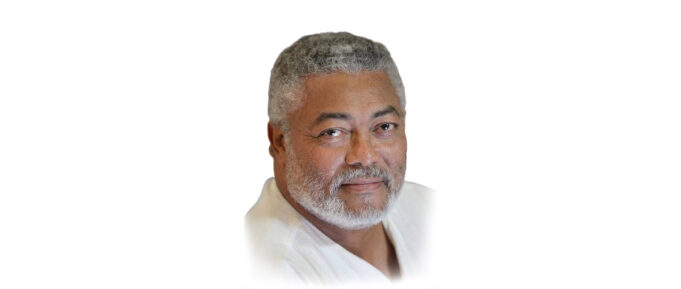In the pantheon of great African leaders who have joined the ranks of the ancestors, Kwame Nkrumah, Nelson Mandela, Robert Mugabe, Muammar Gadhafi, Sekou Toure and Gamal Abdel Nasser, it would be impossible to exclude Flight Lt. Jerry John Rawlings from that number.
Mr. Rawlings led the Republic of Ghana for 19 years from 1981 to 2000 as its longest serving president and is credited with successfully transforming Ghana from military rule to a multiparty democracy with consecutive smooth power transfers.
An official state funeral for Mr. Rawlings was held Jan. 27 in Accra, Ghana, the nation’s seaside capital.
Leaders and voices globally remembered the statesman, who passed away in Ghana on November 12, 2020, after a short illness. He was 73-years old.
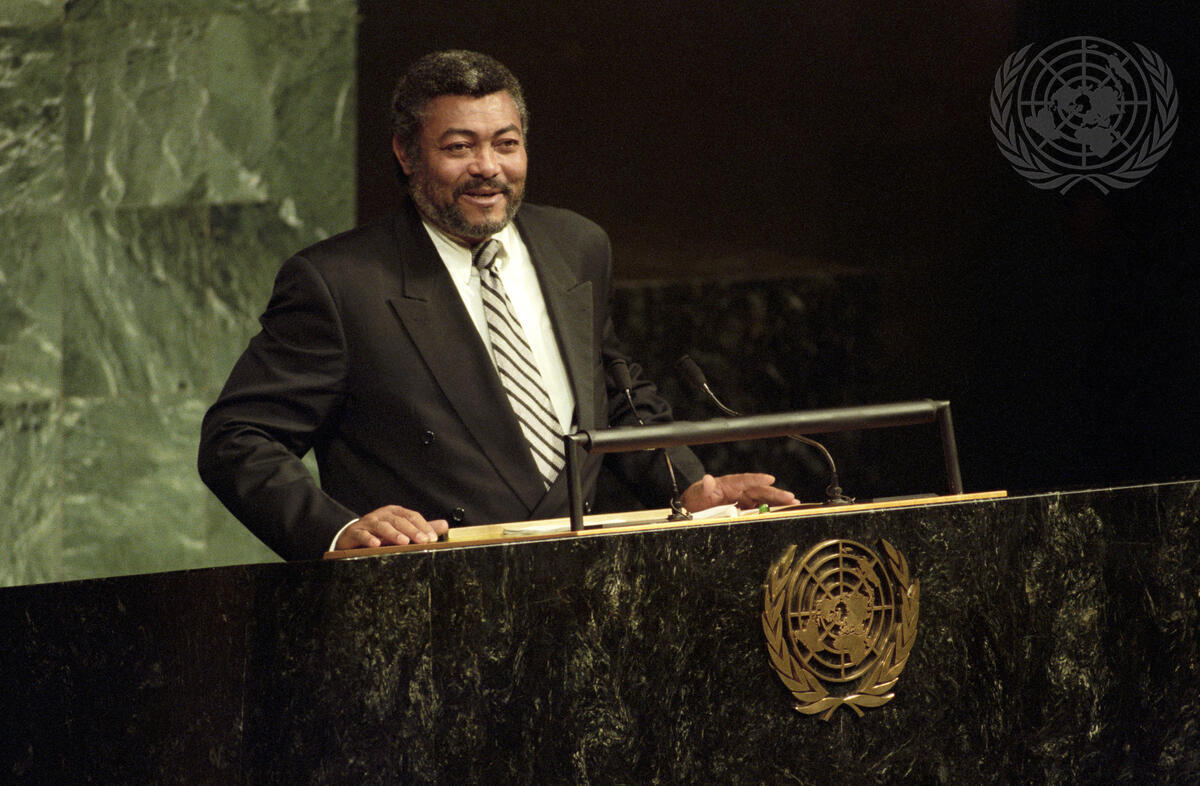
“To Nana Rawlings, the Rawlings family, the loyal followers of President Rawlings and the people of Ghana. It is a great honor to pay our respects to the memory of a great noble brother who has returned to Allah (God) and joined the ranks of the ancestors,” said the Honorable Minister Louis Farrakhan of the Nation of Islam in an official statement issued after the Pan Africanist leader’s passing.
On behalf of the Nation of Islam, his wife Mother Khadijah Farrakhan and his family, the Muslim leader sent condolences. The two men were friends and companions in the struggle of Black people worldwide.
“We shall never forget this man and the love that he had in his heart for Africa, for justice, for truth. Long live the memory of our great brother, long live Ghana, and African liberation,” said Minister Farrakhan.
President Rawlings was laid to rest with full honors of a head of state in the presence of his family, Ghana’s current and former living presidents, government officials, religious leaders, all branches of the armed forces and the people of Ghana.
Liberian President George Weah, Sierra Leone’s leader Julius Maada Bio and their spouses attended the funeral. Nigeria was represented by Prime Minister Brigi Rafini. The United Nations, the African Union, and the regional Economic Community of West African States (ECOWAS) were represented.
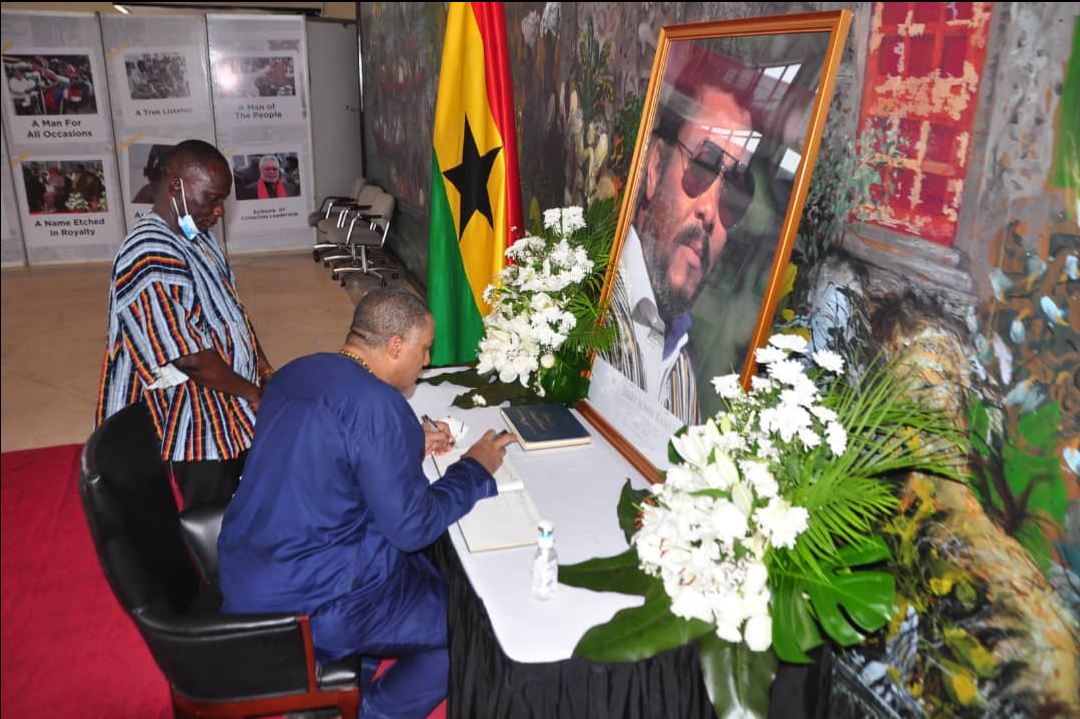
Because of global coronavirus restrictions, many foreign leaders were not present, but sent tributes.
Mr. Rawlings meant different things to different people. What was consistent, however, was the view that he was a man of the people.
“His life’s work was not to champion the causes of those with wealth or power or special connections, but it was to give a voice to those who were not heard,” said Eric Gbeho, reading Mr. Rawlings’ bio during the state funeral.
The onetime military leader was committed to the working poor and oppressed masses.
Mr. Rawlings once said: “For myself, I am ready for whatever sacrifices are required in such a struggle for a better life for our people, and I will forever work with and be at the service of the people who share that common cause.”
Born Jerimiah Rawlings John on June 22, 1947, Mr. Rawlings was from the Anlo State in Ghana’s Volta Region. He was the son of a White Scottish chemist and a Ghanaian woman from the Ewe group. His name was changed after a clerical error by the military listed his middle name as his surname.
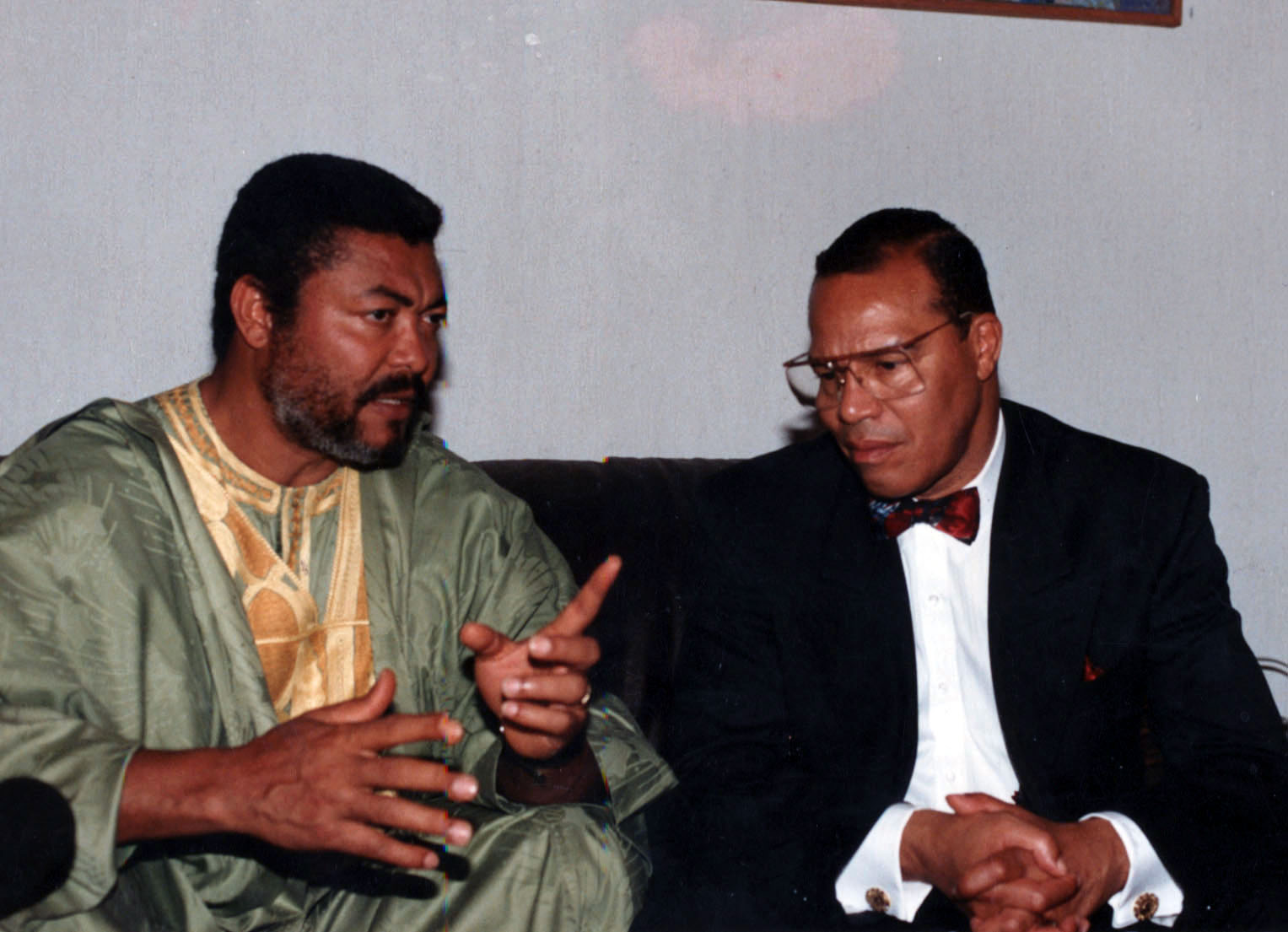
He was educated at the Ghana Military Academy and Training School after graduating the famed Achimota College where other African luminaries such as Dr. Nkrumah and former Zimbabwe President Robert Mugabe were taught.
The state funeral held in Ghana’s Independence Square concluded four days of official ceremonies that began Jan. 24 with a Catholic Requiem Mass at Holy Spirit Cathedral in Accra and a vigil at the Air Force Officers Mess, followed by two days of laying-in-state in the Accra International Conference Center Jan. 25-26.
In Ghana it is said when consequential leaders pass away, “a great tree has fallen” and now the impact of Mr. Rawlings legacy can be fully analyzed.
“I believe that history, on balance, will be kind to him, and will render him a positive verdict on his contribution to the evolution of our nation, and the entrenchment of its democratic institutions and culture,” stated Ghana’s President Nana Akufo-Addo during the funeral.
President Akufo-Addo honored Mr. Rawlings by renaming the University of Development Studies, Tamale—which the late leader helped to establish—the Jerry John Rawlings University of Development Studies, Tamale.
In addition, President Akufo-Addo declared Jan. 7 a national holiday, recognizing the date marking Ghana’s change from military rule to civilian rule under Mr. Rawling’s leadership. Ghana has experienced eight successful elections and transfers of power, which the president said was the greatest tribute to him as the founder of the Fourth Republic.
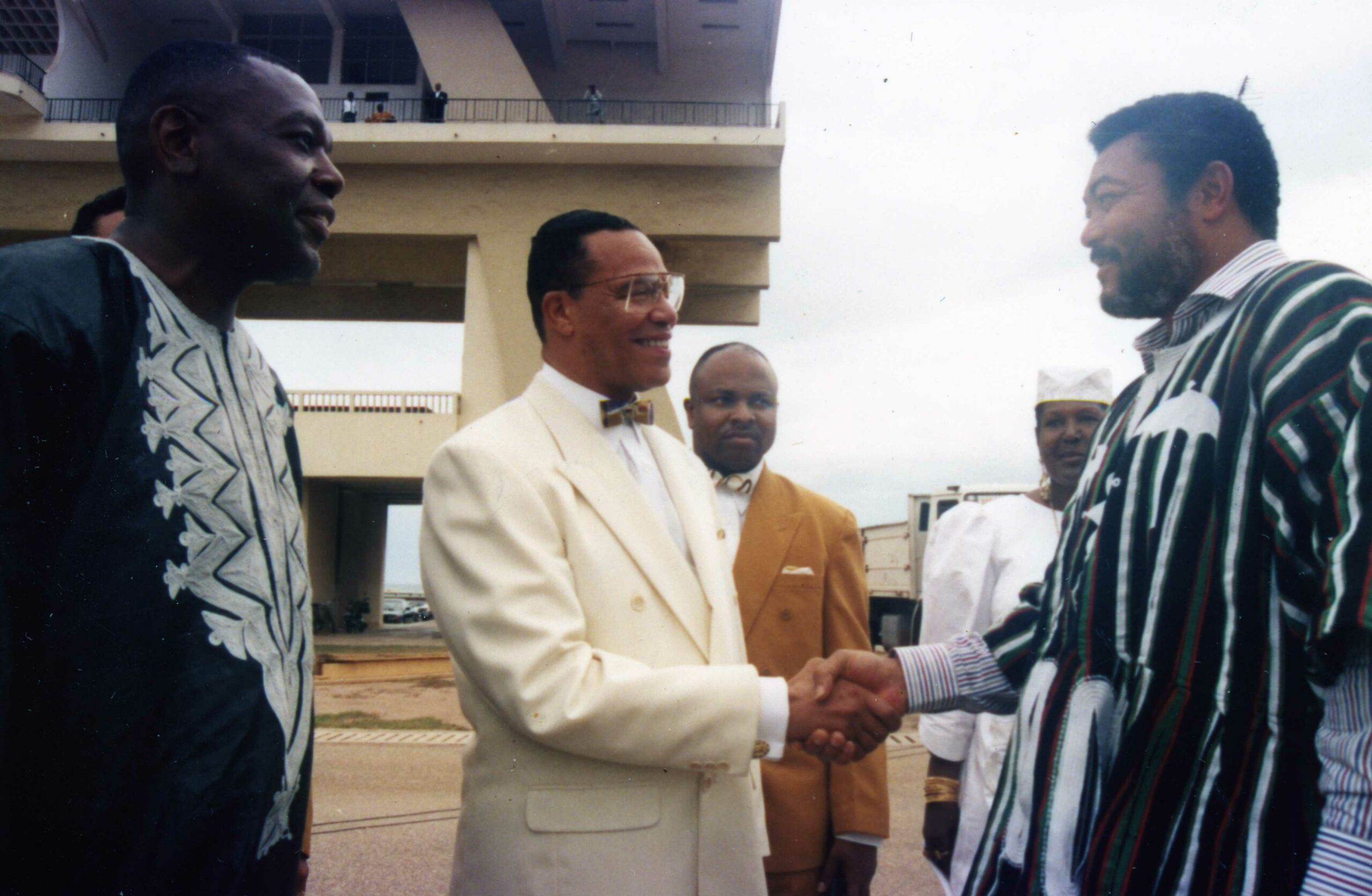
In a statement, former President John Mahama, leader of the National Democratic Congress Party that Mr. Rawlings founded, said, “Boss, you may be gone but your memory will continue to inspire countless generations of Ghanaians to challenge the status quo.”
Mr. Rawlings remains a “soldier of a lifelong and restless quest for freedom and justice,” said Mr. Mahama.
While tributes poured in from around the world since Mr. Rawlings death, some of the most moving were expressed by his family.
His wife and children described Mr. Rawlings, the husband and father, and leader of a nation in expressions that captured the essence of the man.
“We were a team fighting to transform a collapsed state into one of potential prosperity for all,” said Nana Konadu Agyeman Rawlings, his wife of 42 years and former first lady. “You did your best and I played my part in my own way,” she said in her reflection, read on her behalf by their daughter Amina Rawlings.
Mrs. Rawlings described how her husband “always said you did not need titles to define you.”
“You did not need political titles to influence a party to do what is right and honest … so for most you remained ‘chairman.’ To me, you were and always will be Jerry, my love, my life partner, my friend,” she said.
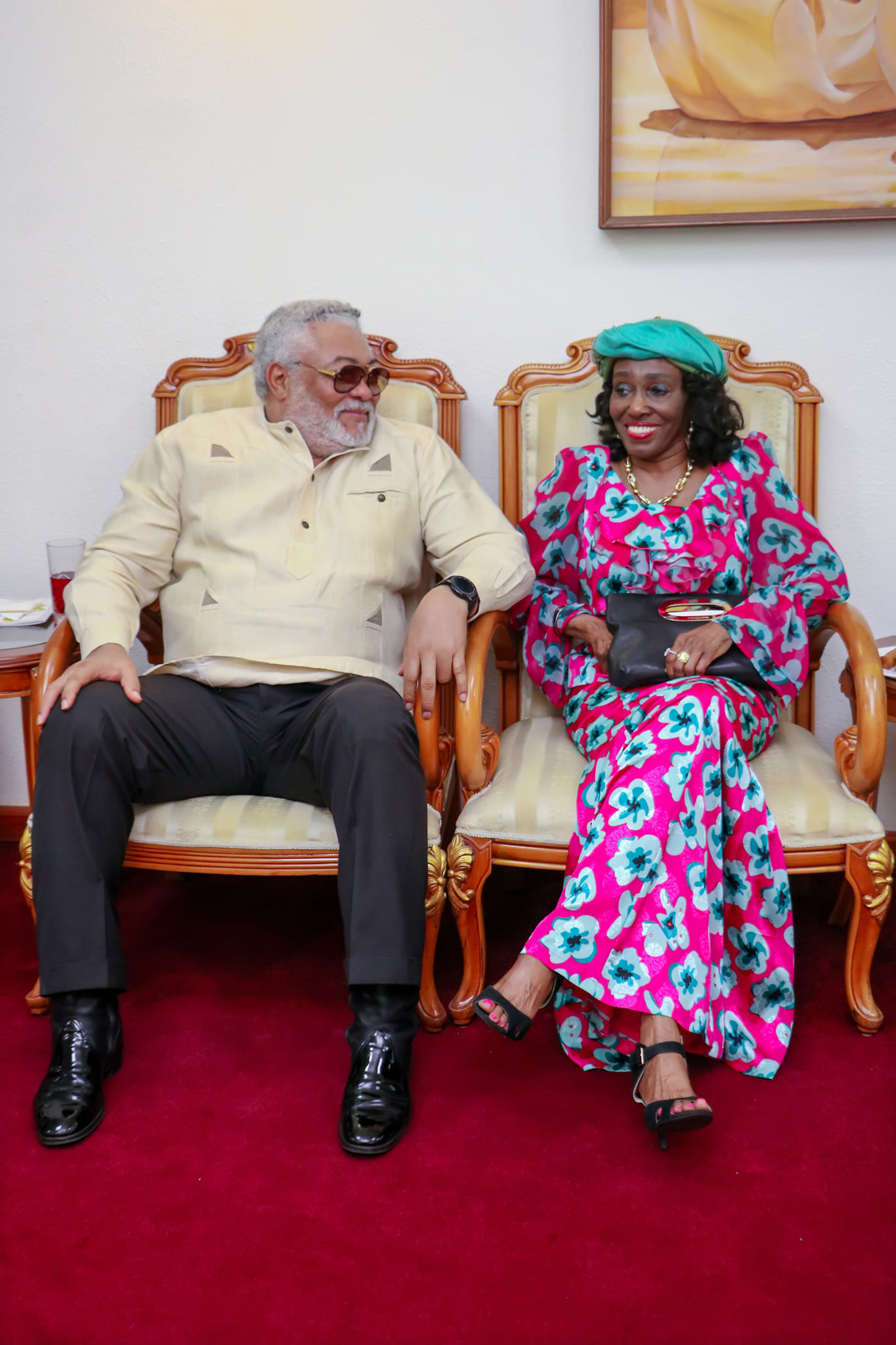
Mrs. Rawlings stood by her husband from the beginning and through the turbulent years, struggling side by side to establish the vision of a new Ghana.
As a family man his oldest daughter, Zenetor, described a “compassionate” and “practical” father when it came to his children. Although public life took much of his time in their formative years, she remembers him teaching her and her sister how to drive and other life skills.
But the Rawlings’ paid a price fighting for a better Ghana.
Because of threats on his life from the volatile circumstances of the revolution he waged, and subsequently, his time in office, Mr. Rawlings family lived separate from him.
Speaking at the Jan. 24 Vigil, Zenator Rawlings said, despite the separation, “he was present,” when the family was together.
During the state funeral at Independence Square, spirituals and several popular songs were sung, reflecting the spirit of Mr. Rawlings.
Songstress Irene Logan delivered a rendition of “The Impossible Dream” as a request from the Rawlings family. She told Ghana’s TV3 she was honored to sing. Ms. Logan came to Ghana as a child refugee from neighboring Liberia during its years of civil war which Mr. Rawlings was instrumental in mitigating as ECOWAS chairman.
“My mother is from Liberia and we were part of the refugees that came to Ghana,” she said. President Rawlings opened Ghana to his African neighbors and family. “Because of that decision, people like me have been able to have a sound education … grow up in a peaceful environment,” said Ms. Logan.
The four-day funeral was live streamed and condolences and verbal salutes were posted on social media.
“Rest in perfect peace,” many said. Others posted “R.I.P. Papa J” and “Brave warrior your race was well run,” posted others. “You paid your dues to make Ghana a democratic nation,” said others.
Via YouTube, Eric Gbezen said Mr. Rawlings made Ghana “proud forever” and was a “leader by example” that the continent needs now.
Mr. Rawlings is also regarded as a good man for Africa based on his efforts to close the divide between continental Africans and the Black Diaspora. He continued a historical precedent in the tradition of Ghana’s first president Kwame Nkrumah—who opened the door of repatriation for greats like W.E.B. Du Bois, George Padmore, and many others from America and the Diaspora.
Mr. Rawlings took courageous and independent stands to open Ghana’s door—sometimes raising the ire of foreign powers like Britain and America. He opened the way for Blacks in the Diaspora such as the Nation of Islam and many others to do business and live in Ghana.
For Tom Ikimi, the former Nigerian foreign minister, Mr. Rawlings was “the pride of Africa” and the “most distinguished” of the second generation of African postcolonial leaders.
“We must pay tribute to a remarkable man who taught the African leadership class how to make power count in very transformational terms,” Mr. Ikimi said of his friend.
On the world stage, Mr. Rawlings strengthened ties with progressive movements worldwide, particularly those belonging to the Non-Aligned Movement during the Cold War between the United States, western powers and the Soviet Union and her satellites. And he provided support to the African struggle for freedom and progress.
Mr. Rawlings expanded economic relations with China, Japan, and Western nations, although he was openly critical of the inequities of Western capitalism in Africa.
His passing represents the loss of a voice that didn’t flinch when criticizing Western behavior. He wasn’t on the list of emasculated African leadership who accepted takeovers by global corporations and U.S. militarization. He was among the last who gave a measure of pushback.
Those who worked with Mr. Rawlings said that although he was a man, his presence was a force of nature however tempered by a deep sensitivity for the people of Ghana, and Africans everywhere.
Mr. Rawlings lived to level the playing field. “He walked the talk,” said a Rawlings era government official. He came to power on a crusade against avarice and corruption, that perpetuated the suffering of the masses of Ghanaians. This is what drove the coups he led.
“Ghana’s situation would have been worse if that intervention hadn’t come,” said John Tia, a former government minister, speaking to Ghana’s Dreamz FM radio.
“The revolution ensured equity and fairness in every aspect of our lives,” he added. Mr. Tia credited the revolution with bringing about the current constitution of 1992.
President Rawlings gained the nickname “Junior Jesus” because he was seen as a savior and one willing to pay the price to redeem his people and advocate for what was just and right. He was uncompromising with the principles of “probity, accountability and transparency” by which he led.
Mr. Rawlings was that “no nonsense guy” who thought if Ghana entered into civilian rule, those principles were paramount, explained Kojo Yankah, a former parliamentarian and official in Mr. Rawlings’ government in a recent Final Call interview.
Ghana was under military rule from 1972 with the promise of curtailing corruption, which never happened, said observers.
“If anything, they had heightened the variance malfeasances … our economy was in a terrible shape and military officers joined in the bandwagon to exploit the system,” said Mr. Yankah.
He told The Final Call that Mr. Rawlings intervened in 1979 as Ghana was preparing for elections, which he argued could not happen until corruption was uprooted. When he turned the government back over to civilian rule, the corruption resurfaced causing another intervention in 1981.
“He entered on an anticorruption crusade and he and his men went very far into cleaning the system,” Mr. Yankah said.
Mr. Rawlings might be considered an African strong man by some, but he led with integrity, lauded for keeping his word to transition to multiparty elections and democracy in 1992.
He founded the National Democratic Congress (NDC) Party. The constitution was changed which included term limits. He won election in 1992 and again in 1996. Honoring the constitutional term limits, he stepped away from the presidency in 2000.
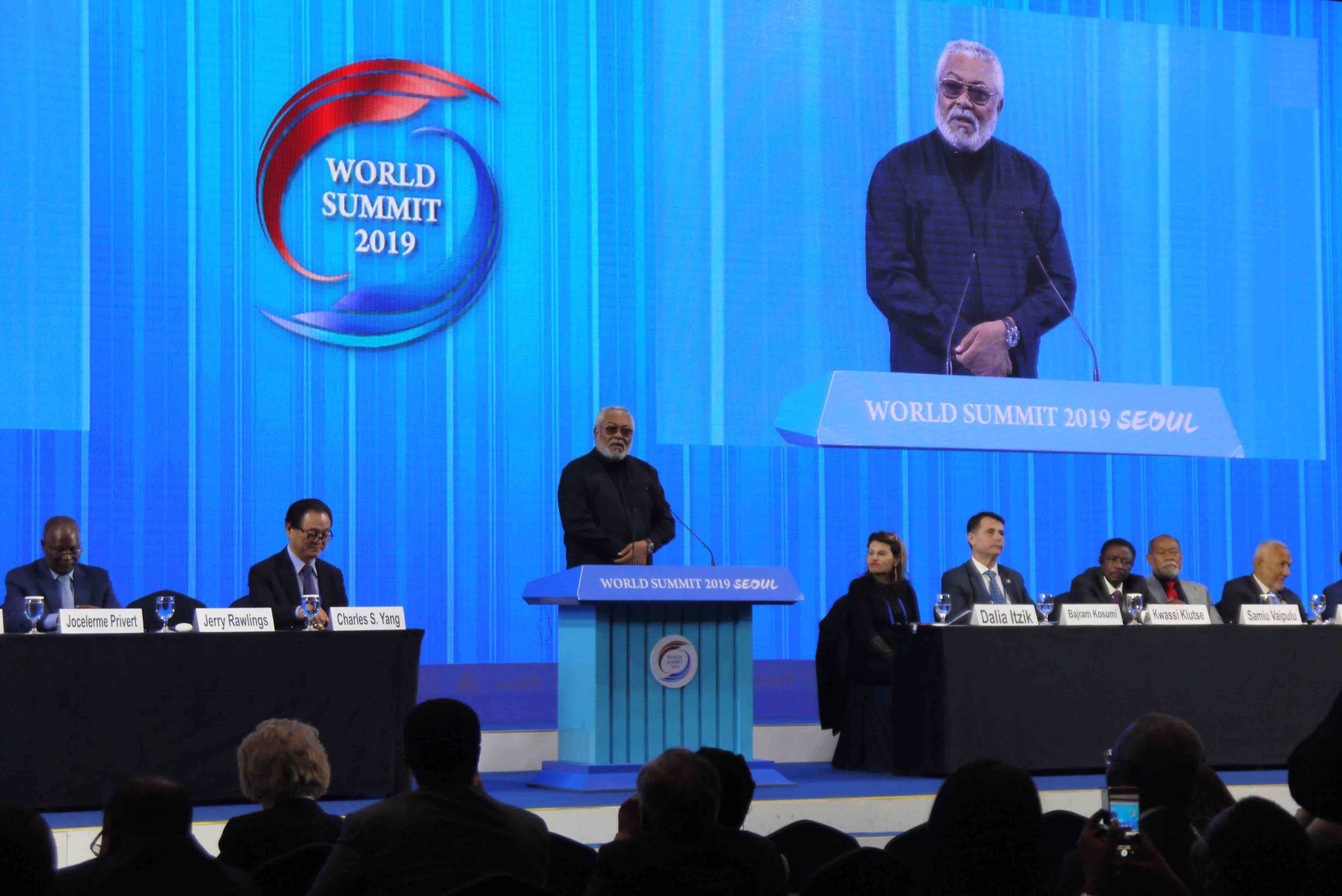
Although Mr. Rawlings came to power initially by military interventions, some credited him with ending coups in Ghana.
He also proved himself as a leader for Africa by championing causes he saw as good for the continent.
When the time for a new secretary general of the United Nations arrived in the late 1990s, he fought for an African to be tapped for the job. Kofi A. Annan of Ghana was eventually chosen to serve as the seventh Secretary-General of the United Nations. His tenure lasted from 1997 to 2006.
“Fighting for Africa to have a United Nations secretary general, Kofi Annon … he really championed that cause,” Zenetor Rawlings told BBC. “There were a lot of things that he did, which he did not brag about, but took a keen interest in.”
Zenetor Rawlings is an elected Member of Parliament in Ghana. She told BBC it was good that people knew her father’s contribution while he was alive.
“Rawlings was really, a man of the people,” said Attorney Robert Bennet, Ghana’s horary council general in the United States.
Attorney Bennet said President Rawlings was regarded worldwide as a “genuine Pan Africanist” and known by everyday people across the continent. The Chicago attorney worked closely with Mr. Rawlings over the years.
The Accra International Conference Center where President Rawlings lay in state was constructed under his leadership and out of his vision to see Ghana as a hub for international conferences.
At the conference center, the general public, traditional and religious leaders and heads of political parties, current and past government ministers, members of the diplomatic corps, and all 275 Members of Parliament filed passed Mr. Rawlings’ remains encased in a towering glass enclosure and floral adorned casket.
At intervals African drums broke the stoic atmosphere of the entrance hall of the conference center. Outside a bold proclamation, “OUR LEGEND LIVES ON,” adorned the building.
In true African form, the two days of laying-in-state concluded in a culturally rich display of music and dance. Mr. Rawlings had deep respect for traditional African culture and was an enstooled chief in his home state.
On the final day of tribute, Ghanaians lined the streets to have a final view of Papa J., as the masses knew him, along the route from Independence Square to the military burial grounds at Burma Camp, the nation’s military headquarters.
“It’s expected because he was a very much part and parcel of our life,” said Fritz Baffour, who served as minister of information in the Rawlings government, while talking to local media.
“Since 1979, he’s been our iconic figure and a very powerful human being in our scheme of things. So, it is expected of Ghanaians,” said Mr. Baffour.
With a full military formation and escort, the flag draped coffin of the former commander-in-chief of the Ghana Armed Forces and president slowly moved through parts of Accra. The procession graced the route, signaling an end to an era, but Ghana lives because Mr. Rawlings came its way.
Mr. Rawlings was buried in a newly created section reserved for presidents and was given a 21-gun salute.
During the Jan. 24 mass of prayers and hymns Archbishop Charles Palmer Buckle described Mr. Rawlings as a leader who was evolving.
“Jerry in his own way was always hungering and thirsting for righteousness,” said Archbishop Buckle. “In his own way, he fought for the poor, worked for justice to be established for the underprivileged and he could not tolerate the slow pace at which this was coming to bear,” he said.
“Let us pray to God to raise up many more Jerry John Rawlings’ to help this country be a better place for all,” said the archbishop. “Big brother J.J., rest in perfect peace. Amen.”
While Kwame Nkrumah’s place is secure in the pantheon of founding fathers of post-colonial nations, the significance of the J.J. Rawlings’ role as practical framers of the postcolonial continent will remain etched in Africa and the Black World’s collective minds.
President Rawlings was interred at the Military Cemetery in Accra, the designated burial ground for all presidents. Mr. Rawlings is survived by former First Lady Konadu Agyemang Rawlings and four children Zanetor Agyeman-Rawlings, Yaa Asantewaa Rawlings, Amina Rawlings, and Kimathi Rawlings.












